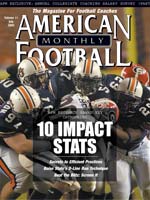AMERICAN FOOTBALL MONTHLY THE #1 RESOURCE FOR FOOTBALL COACHES
Article CategoriesAFM Magazine
|
Tuesday Morning QuarterbackHealth: Above All Elseby: Richard Scott © More from this issue Have another bowl of big ice cream. Make it a big one. Pour on some of that chocolate syrup, too. Have another fast-food cheeseburger. Make it a double cheeseburger, with extra cheese. And fries. Or better yet, onion rings. How about some fried chicken? How about more caffeine? Choose your poison: coffee or cola. How about a few too many beers? Maybe a few too many mixed drinks? Or perhaps a big dip of smokeless tobacco? Or a cigarette or two ... or three ... or four ... or more And while we’re at it, who needs sleep? Or exercise? Or a break from the daily grind? Stress is one of the biggest reasons why we reach for comfort feeds or old familiar vices, and the coaching profession is overloaded with the kind of pressure that le....The full article can only be seen by subscribers. Subscribe today!
|
|
|||||||
| HOME |
MAGAZINE |
SUBSCRIBE | ONLINE COLUMNISTS | COACHING VIDEOS |
Copyright 2026, AmericanFootballMonthly.com
All Rights Reserved





